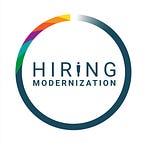Interview series: City and County of San Francisco’s Civil Service Commission
The Hiring Modernization Project is launching a series of interviews with some of the key members of its steering committee to introduce various entities that play a large role in supporting the merit-based hiring process and share their desired outcomes for the project.
We begin this series with Sandra Eng, Deputy Director for the Civil Service Commission.
What is the role of the Civil Service Commission and its staff?
The Civil Service Commission is made up of six staff members and five commissioners. Commissioners make decisions on appeals and oversee the merit-system. Our staff members play a huge part in supporting the merit-system by ensuring that any idea or solution (e.g., rule or policy) is presented through a staff report and at public Civil Service Commission meetings. Staff ensures all cases covered include perspectives from a wide range of stakeholders to ensure Commissioners can make informed decisions. Commissioners ultimately decide whether to adopt a rule/policy and make the final decisions based on information presented by the Civil Service Commission staff, management, unions, current employees and members of the public.
How was the Civil Service Commission formed?
San Francisco has one of the oldest Civil Service Commissions in the US, dating back to the 1900 Freeholder Charter. Unfortunately, its history originated from people making poor judgement in decision-making processes and from situations where individuals were not being hired into local government positions based on their skills, knowledge and experience, but rather through favoritism, nepotism, cronyism, corruption and so forth. The Civil Service Commission was created out of the need for transparency and accountability in local government. Today, the commissioners are five individuals who are appointed by the Mayor of which two must be female.
Tell us more about the merit-based hiring process:
The merit-based hiring process is a way to assess the knowledge, skills, and abilities of an individual to perform the essential functions of a position. We establish an examination instrument that tests the abilities of the candidate based on a job analysis by subject matter experts. Everyone who meets the minimum qualifications of a position are provided with an opportunity to compete in a fair examination process. The successful candidates are then eligible to be hired permanently in a civil service position.
The Civil Service Commission rules provide the merit-system with a structure for candidates and employees to exercise their appeal rights. Our goal is to always utilize fair methods where everyone has equal opportunity to apply, while also ensuring we are hiring the best qualified candidates to provide public services to San Francisco residents. This philosophy also applies to positions that are exempt from the merit-system.
What does a typical Civil Service Commission meeting look like?
Civil Service Commission meetings are held on every 1st and 3rd Monday of the month (unless there is a holiday). Special sessions may be convened but require advanced public notice. Civil Service Commission meetings are open to the public and provide a space for public comment on any matter voted on by the Commissioners. Some matters may be held in closed session as required by law due to the confidential personnel nature of the item or matters regarding peace officers. The meetings serve as public forums where candidates can appeal certain merit-system decisions and future employment restrictions. Common examples of appeals include:
- Appeals due to a disqualification from an examination during the hiring process
- Cases of discrimination (harassment, retaliation, etc). These cases do not always have to do with hiring.
View meeting times and locations here.
What impact do you hope to deliver to candidates and current employees?
Maintaining a relationship with our candidates and taking the time to reach out to them individually has been instrumental. We should always be letting them know what delays may occur so they do not lose interest in the position. We can have a huge impact on current employees by serving as a trusted resource they can call for guidance or reassurance on various situations. We get calls all the time from people asking us “How does this work?” or “Does this seem odd to you?” We try to encourage, educate, support and motivate all employees who contact us.
What do you think technology can really assist you with?
Technology can really assist departments with time management and prioritization of tasks throughout the entire hiring process. We need better ways of displaying the entire hiring process, the time it takes to complete each step, and what the dependencies are between the different parts of the hiring process so everyone can understand the big picture.
We also know it can sometimes feel like a very cold process and our HR analysts do so much already, so it would be very helpful if we could use technology to reach out to as many people as possible so we do not lose applicants along the way.
What is one data question you wish you could answer?
I have two: in each department, where does the delay in hiring occur? And what are the results of different outreach and recruitment methods? The second one is especially important as we expand ways to offer equal employment opportunities and diversify our applicant pools.
How do you see the Civil Service Commission’s role changing in the future?
Over the years there have been many changes made to the merit-system. The results of those changes are not always recognizable because of many moving parts. It will always be a continuous process to check and recalibrate the merit-system to make sure we are providing equal opportunities for all while diversifying our workforce without violating the law or our merit-system principles.
The Civil Service Commission staff have been active participants in the Hiring Modernization Project since it began in the Summer of 2017. Learn more about the Civil Service Commission here.
